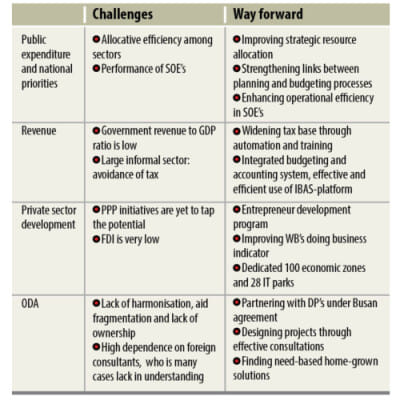Political commitment holds the key

Political commitment is a must to help Bangladesh become a self-reliant nation, said a senior official of the World Bank Group.
“You will not need a development partner if you have a very strong and efficient banking sector,” said Ilias Skamnelos, lead financial sector economist of the FCI under the World Bank Group.
He spoke at a session on “Innovative Financing for a Self-reliant Bangladesh” at the two-day Bangladesh Development Forum 2020 at the Bangabandhu International Conference Centre in Dhaka yesterday.
The government should think of how to leverage the tools to make the development partners irrelevant. It should determine what makes more sense – direct interventions or incentives for the private sector, he said.
Skamnelos said the issue of default loans should also get more focus.
If a solution can be brought to the default loan problem, then a sizable amount of capital will be freed up, which can be lead to lower interest rates, he said.
Skamnelos suggested the government should develop a strong supervisor for the banking sector.
“And moreover, steps should be taken for a healthy capital market.”
The government can build more institutional investors for the sake of the stock market.
A report of the General Economic Division of the Bangladesh Planning Commission estimated that an additional investment of $928.48 billion (at fiscal 2015-16 constant prices) would be required for the implementation of Sustainable Development Goals, said Monowar Ahmed, secretary of the Economic Relations Division.
As such, the average annual investment required for SDG implementation would be $66.32 billion during the period, he said in the session chaired by Planning Minister MA Mannan.
The GED identifies broadly five potential sources of financing: private sector financing (42.09 per cent), public sector financing (35.50 per cent), public-private partnership (5.59 per cent) and external financing (14.89 per cent).
Development partners need to mobilise private capital to achieve the SDGs through innovative financing. This may include practices as diverse as blended finance, impact investment and financial inclusion drives, Ahmed said.
The development partners therefore need to engage the private sector for development results in two major ways: engaging, primarily large and international, companies around their business activities in developing countries; and mobilising private capital for development purposes, to complement public financing.
Bangladesh has been a success story. But the government should not forget that the abundance of cheap labour will no longer be available with the economic growth, said Yutaka Yoshino, programme leader for equitable growth, finance and institutions of the World Bank.
He made the comment in another session titled “Private sector engagement and trade facilitation”.
He also stressed the need for rationalisation of the supplementary duty and the importance of increased focus on bonded warehouse.
“There are so many opportunities left for Bangladesh and there are many areas to grow,” said John Smith-Sreen, economic growth office director of the USAID.
The government should find out sectors other than garment, where the economy can grow, he said, adding that more focus should be given on the agro-processing, healthcare, pharma and tourism sectors.
The ERD should put forward an action plan on how to make most of the Bangladesh Development Forum, he added.
There is a lack of coordination among different ministries and divisions, said Rubana Huq, president of the Bangladesh Garment Manufacturers and Exporters Association.
Despite conducting meetings alone, all the efforts should be stitched together to bring a good result, she said.
Shamsul Alam, member of the GED, presented the outline of the eighth Five-Year Plan at a session on “Effective partnership for implementing the 8th five-year plan aiming towards achieving SDGs”.
To help materialise their plans, the government will require Tk 7,741,800 crore in investment over the next five years, about 75 per cent of which will come from the private sector while the rest will be publicly funded, he said.
Although the role of development partners has become less significant over time, they are still considered as major players as far as socioeconomic development is concerned, he said.
“Bangladesh is very good in debt repayment,” said Md Tajul Islam, LGRD minister.
He also sought increased support from the development partners to help Bangladesh keep growing.
The tax-GDP ratio in Bangladesh is still low and the government should take efforts to raise it, said Rensje Teerink, EU ambassador to Bangladesh.
He also expressed his willingness to work with Bangladesh to upgrade the business climate.
The government estimated $68.5 billion of investment is needed for adaptation and mitigation projects/programmes by 2030 to mitigate the impact of climate change, said Ziaul Hasan, secretary of the environment ministry.
It is working to implement the programmes with its own fund, he said in a session on “Partnership for climate change and its financing.”
Development partners, bilateral and multilateral donors should come forward to assist in implementation of the programmes to achieve the global mitigation goal under the Paris agreement, he said.
Several studies have been conducted to understand how climate change can affect Bangladesh and what steps the government should take.
“No new study or survey is required now. What we need now is financial support from the development partners.”

 For all latest news, follow The Daily Star's Google News channel.
For all latest news, follow The Daily Star's Google News channel. 




Comments